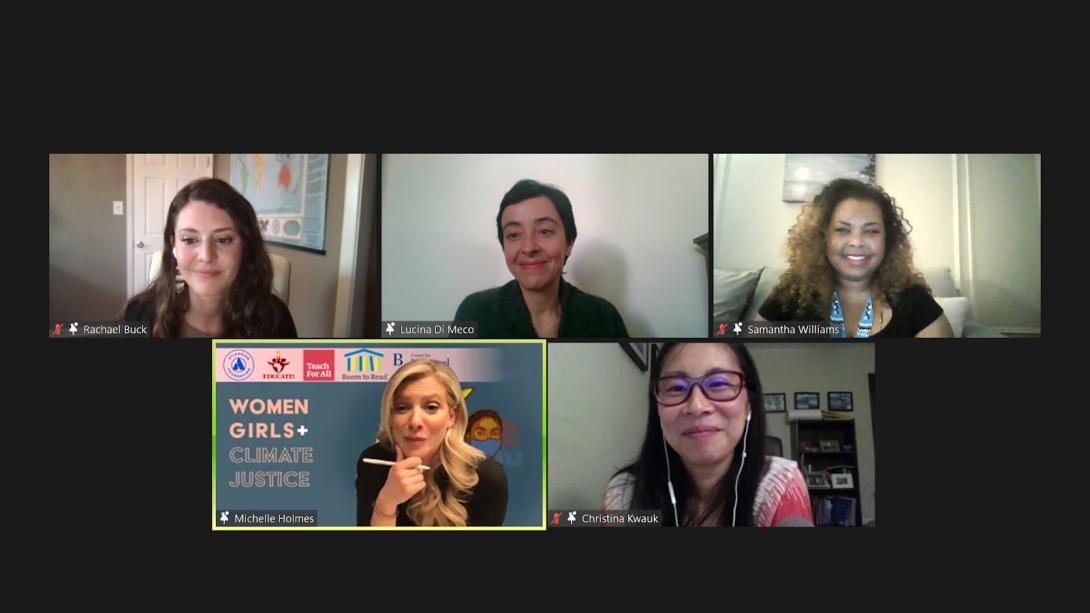Atlassian Panel Highlights the Role of Girls’ Education in Addressing Climate Change

Christina Kwauk, Brookings Institution
On April 13th, Teach For All’s Global Director of Girls’ Education, Samantha Williams, joined Christina Kwauk, Nonresident Fellow at the Brookings Institution and Associate Director of the Monitoring and Evaluation of Climate Change Education Project (MECCE); Lucina Di Meco, Senior Director of Girls’ Education and Gender Equality at Room to Read; and Rachael Miller Buck, Head of External Relations at Educate! for a panel on girls’ education and climate change hosted by the Atlassian Foundation. The panel offered Atlassian’s global staff insights into how the foundation’s grantee partners are improving girls’ education and how climate change, education, and gender intersect.
The conversation began with an overview of each organization and its girls’ education strategies, followed by a presentation from Christina Kwauk exploring the intersection of girls’ education and climate change. The panel then discussed the impact of climate change on girls and women, who along with other vulnerable members of society have often contributed the least to global emissions while facing the greatest consequences.
For example, during times of persistent or acute weather crises (including drought, storms, fires, and floods), attending or returning to school is often harder for girls, particularly in low- to middle-income countries. During these emergencies, families face greater economic pressure and potential loss of property or dislocation, and are thus more likely to marry off their daughters. During droughts, girls often find themselves out of school due to gender roles that dictate that girls secure the family’s water supply, an endeavor that is more grueling when water sources are fewer. Lack of water can also keep menstruating girls home when schools aren’t able to provide sanitary facilities. The Malala Fund estimates that by 2025, nearly 12.5 million girls will have their education disrupted each year, with climate-induced challenges being significant factors.
Additionally, girls and women are often left out of decision-making when disasters and emergencies strike. Where gender bias has contributed to girls and women having lower education levels and occupying fewer positions of power, the decision-making authority more often lies with men. This is an enormous missed opportunity for communities to develop plans and solutions that factor in girls’ and women’s relevant perspectives and lived experiences.
The good news, however, is that educating girls and women is one of the most effective climate change interventions we have. When girls are educated, benefits to girls, women, and society include economic empowerment, reduction in early pregnancies and marriage, and increased political and social leadership. Moreover, when girls are educated about sexual and reproductive health, these benefits increase dramatically. Research suggests that girls’ education is about four times more effective than solar power in reducing carbon dioxide.
Education also enables girls to secure the life and academic skills needed to access green sector jobs, which are critical to protecting all of our futures, as well as other jobs that increase their own economic mobility and resilience. Girls who are informed and aware of climate change and its risks are better equipped to take care of themselves during crises and to educate others to do the same.
The panelists shared stories of impact from their various organizations related to these challenges and opportunities. Near the end of the session, the daughter of an Atlassian employee asked how young people like her could help. Samantha Williams shared the story of Teach For All Student Advisory Council member Dewina Leuschner, whose concern about the changing climate landscape in her own hometown in Germany helped her decide to get involved in activism. Samantha encouraged the teenager to be inspired by the needs around her, be unafraid to take action, and to seek the support of others.
“We were thrilled to convene a panel of women doing impactful work to ensure that all girls receive a quality education,” said Atlassian Foundation International Director, Michelle Holmes. “The panel provided an opportunity to engage Atlassian employees around the world and spanning a wide range of functions to learn more about the intersection between girls’ education and climate and hear first-hand from our partner organizations about the opportunities and challenges in this space. Atlassian Foundation is not something separate from the company—the Foundation is every Atlassian—and it was a privilege to bring so many Atlassians into a conversation with this accomplished group of leaders from the organizations with which the Foundation partners.”
To learn more about how Teach For All supports global girls’ education, visit teachforall.org/girls. You can also subscribe to our new podcast, Inside Global Girls’ Education, to hear conversations about gender equity and education with global thought leaders and members of the Teach For All network.
Learn more about the Atlassian Foundation and read the Brookings papers on education and climate change.



